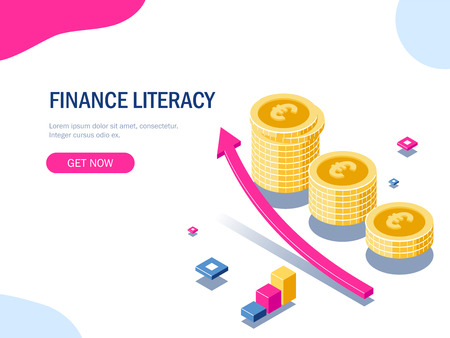1. Understanding the Value of Financial Podcasts
Financial podcasts have become an essential resource for anyone looking to improve their financial literacy and build long-term wealth. They offer valuable insights from experts, real-life success stories, and easy-to-understand explanations of complex financial concepts. Whether you’re new to personal finance or a seasoned investor, financial podcasts can help you stay informed and make smarter money decisions.
How Financial Podcasts Help You Learn
Podcasts provide a unique way to absorb financial knowledge without requiring dedicated reading time. Here’s why they’re so effective:
- Convenience: Listen while commuting, exercising, or doing daily tasks.
- Diverse Perspectives: Gain insights from experienced investors, economists, and financial planners.
- Real-World Examples: Hear success stories and practical tips from people who have achieved financial independence.
- Up-to-Date Information: Stay informed about market trends, investment strategies, and economic changes.
Key Topics Covered in Financial Podcasts
Financial podcasts cover a wide range of topics, making them useful for different stages of your financial journey. Below is an overview of common topics you’ll find:
| Topic | Description |
|---|---|
| Personal Finance Basics | Budgeting, saving, and managing debt effectively. |
| Investing Strategies | Tips on stocks, real estate, cryptocurrency, and more. |
| Wealth-Building Techniques | Diversifying income streams and long-term financial planning. |
| Earning More Money | Career growth, side hustles, and passive income ideas. |
| The Psychology of Money | The mindset and habits needed for financial success. |
The Accessibility Advantage of Podcasts
A major benefit of podcasts is their accessibility. Unlike traditional financial education methods such as books or courses that require active reading or watching, podcasts fit seamlessly into your daily routine. This makes it easier to stay consistent with learning about money management without disrupting your schedule.
(1) Free Learning Resource
The majority of financial podcasts are free to access, making them an affordable way to gain high-quality financial education without spending money on expensive courses or consultations.
(2) Variety of Formats
You can choose from interviews with finance experts, Q&A sessions where hosts answer listener questions, deep dives into specific topics, and even storytelling formats that make learning engaging and relatable.
(3) Easy to Revisit Information
If you ever miss something important or want to reinforce a concept, you can easily replay episodes or find additional content on similar topics within the same podcast series.
(1) Who Should Listen?
No matter your level of expertise—whether youre a beginner trying to get out of debt or an experienced investor looking for advanced strategies—theres a financial podcast suited to your needs.
(2) How Often Should You Listen?
You don’t need to listen every day to see benefits. Even tuning in once or twice a week can significantly improve your understanding of personal finance over time.
(3) What Type of Podcast Works Best?
If you prefer short summaries, look for daily news-style financial updates. If you enjoy in-depth discussions, opt for long-form interviews with industry leaders.
2. Choosing the Right Financial Podcasts
With thousands of financial podcasts available, finding the right ones that align with your goals can be overwhelming. The key is to focus on reputable sources, engaging content, and hosts with credible experience. Here’s how you can identify the best financial podcasts for your needs.
How to Identify High-Quality Financial Podcasts
Not all financial podcasts are created equal. Some provide valuable insights from industry experts, while others may lack depth or credibility. Consider these factors when selecting a podcast:
(1) Credibility of the Host
Look for podcasts hosted by experienced financial professionals, economists, or successful investors. Research their background to ensure they have expertise in the subject matter.
(2) Content Relevance
Choose podcasts that align with your financial goals. Whether youre interested in investing, budgeting, or wealth building, find shows that focus on topics relevant to you.
(3) Listener Reviews and Ratings
Check reviews and ratings on platforms like Apple Podcasts and Spotify. Highly-rated podcasts with positive feedback from listeners often indicate quality content.
(4) Frequency and Consistency
Avoid podcasts that rarely update or have inconsistent schedules. Regularly updated podcasts show commitment and reliability in delivering fresh insights.
Comparison of Podcast Types
Different types of financial podcasts serve different purposes. Here’s a quick comparison to help you decide which type suits your learning style:
| Podcast Type | Description | Best For |
|---|---|---|
| Expert Interviews | Features discussions with finance professionals and industry leaders. | Gaining professional insights and expert advice. |
| Personal Finance Tips | Focuses on everyday money management strategies. | Budgeting, saving, and debt management. |
| Investment Strategies | Covers stock market trends, real estate, and other investment opportunities. | Building wealth through strategic investments. |
| Episodic Storytelling | Presents real-life financial success stories and case studies. | Learning through relatable experiences. |
Where to Find Reliable Financial Podcasts
You can discover high-quality financial podcasts on various platforms. Here are some popular options:
(1) Apple Podcasts & Spotify
The most popular platforms with extensive libraries of financial content.
(2) YouTube & Video-Based Podcasts
If you prefer visual content, many podcasters upload episodes on YouTube.
(3) Financial News Websites & Blogs
Many finance-focused websites host their own expert-led podcasts.
(4) Recommendations from Trusted Sources
Ask financially savvy friends or follow recommendations from reputable finance blogs.
Selecting the right financial podcast can make a big difference in improving your financial literacy and wealth-building journey. Take the time to explore different options and choose those that offer valuable insights tailored to your goals.

3. Maximizing Your Learning from Podcasts
Listening to financial podcasts is a great way to gain insights, but the real value comes from applying what you learn. Here are some effective strategies to help you retain information and put it into action.
How to Retain Key Insights
Simply listening isn’t enough; you need to actively engage with the content. Here are some ways to make sure you remember key takeaways:
(1) Take Notes
Jot down important points while listening. This helps reinforce the information and gives you a reference for later.
(2) Summarize What You Learned
After finishing an episode, summarize the main ideas in your own words. This makes the concepts clearer and easier to recall.
(3) Discuss with Others
Talking about what you’ve learned with friends or family can deepen your understanding and offer new perspectives.
Applying Podcast Insights to Your Finances
Once you’ve retained key insights, the next step is implementation. Here’s how you can apply what you learn:
| Podcast Topic | Actionable Steps |
|---|---|
| Budgeting Tips | Create a monthly budget and track expenses. |
| Investing Basics | Open an investment account and start with small amounts. |
| Debt Reduction Strategies | List all debts and choose a repayment strategy (e.g., snowball or avalanche method). |
| Savings Techniques | Set up an automatic savings plan for emergencies or goals. |
Building a Financial Podcast Routine
Consistency is key when using podcasts as a learning tool. Follow these steps to integrate financial podcasts into your routine:
(1) Set a Listening Schedule
Decide on specific days or times for podcast sessions, such as during your commute or workout.
(2) Create an Action Plan
After each episode, list one actionable step you can take based on what you learned.
(3) Track Your Progress
Use a journal or app to monitor how podcast lessons impact your finances over time.
By actively engaging with financial podcasts and applying their lessons, youll build wealth and improve your financial literacy more effectively.
4. Applying Podcast Insights to Your Financial Plan
Listening to financial podcasts is a great way to expand your knowledge, but the real value comes from applying what you learn. Here are some practical ways to integrate podcast advice into your budgeting, saving, and investment decisions.
Using Podcast Advice for Budgeting
Many financial podcasts emphasize the importance of having a structured budget. Here’s how you can incorporate their insights into your personal finances:
- Track Your Expenses: Use budgeting apps like Mint or YNAB to monitor your spending and identify areas where you can cut back.
- Follow the 50/30/20 Rule: Allocate 50% of your income to necessities, 30% to discretionary spending, and 20% to savings and investments.
- Automate Savings: Set up automatic transfers to savings accounts based on podcast recommendations about paying yourself first.
Applying Saving Strategies from Podcasts
Savings strategies vary depending on your financial goals. Many podcasts suggest different approaches for short-term and long-term savings. Here’s a simple breakdown:
| Savings Type | Description | Podcast-Recommended Tip |
|---|---|---|
| Emergency Fund | A fund covering 3-6 months of expenses. | Start with small contributions and increase over time. |
| Short-Term Goals | Savings for vacations, gadgets, or other planned expenses. | Create separate sinking funds for each goal. |
| Retirement Savings | Long-term investments for financial security in retirement. | Max out employer-sponsored plans like a 401(k) if possible. |
Implementing Investment Advice from Podcasts
If youve been listening to investment-focused podcasts, you may have encountered various strategies. Heres how you can apply them effectively:
(1) Start Small and Stay Consistent
If youre new to investing, begin with small amounts in low-cost index funds or ETFs, as many experts recommend. Consistency is key—invest regularly regardless of market fluctuations.
(2) Diversify Your Portfolio
Avoid putting all your money into one asset type. Financial podcasts often stress diversification across stocks, bonds, real estate, and alternative investments.
(3) Take Advantage of Tax-Advantaged Accounts
If a podcast mentions Roth IRAs or HSAs, consider opening one to maximize tax benefits while growing your wealth.
5. Building a Habit of Continuous Financial Education
Staying informed about personal finance requires consistency. By incorporating financial podcasts into your daily routine, you can build a habit of continuous learning and stay updated on key financial trends and strategies. Here are some practical ways to make financial podcasts a regular part of your life.
How to Incorporate Financial Podcasts Into Your Routine
Listening to financial podcasts doesn’t have to feel like a chore. By integrating them into your daily schedule, you can absorb valuable financial knowledge effortlessly. Below are some easy ways to do so:
| Time of Day | How to Listen |
|---|---|
| Morning Routine | Listen while getting ready for the day or during breakfast. |
| Commute | Tune in while driving, taking public transportation, or walking. |
| Exercise | Play an episode during workouts or outdoor runs. |
| Lunch Break | Catch up on an episode while eating lunch. |
| Household Chores | Make cleaning or cooking more productive by listening to a podcast. |
| Before Bed | Unwind with a short episode before sleeping. |
Tips for Retaining and Applying What You Learn
(1) Take Notes on Key Insights
Writing down important takeaways from each episode can help reinforce new concepts. Keep a notebook or use a note-taking app to jot down actionable advice.
(2) Discuss with Friends or Family
Talking about what you’ve learned with others can solidify your understanding and even introduce new perspectives.
(3) Apply New Strategies Gradually
Avoid feeling overwhelmed by implementing small changes based on what you learn. Start with one or two strategies and build from there.
(4) Follow Up with Additional Research
If a particular topic interests you, dive deeper by reading books, articles, or exploring other financial resources.
(5) Set Financial Goals Based on Lessons Learned
Use insights from podcasts to refine your financial goals and create an action plan to achieve them.
Making Financial Podcasts Part of Your Long-Term Growth Strategy
The key to improving financial literacy is consistency. By regularly listening to financial podcasts and applying what you learn, you can develop better money habits, make informed investment decisions, and steadily build wealth over time.


